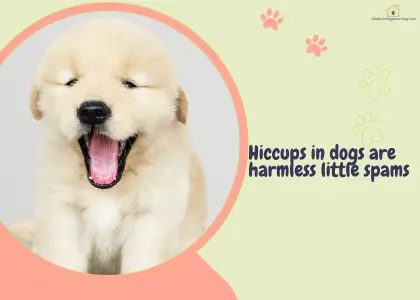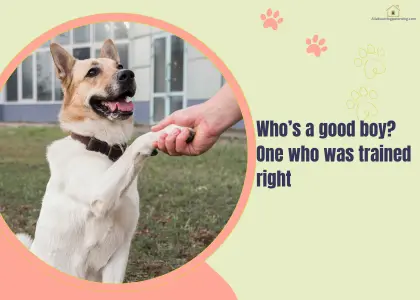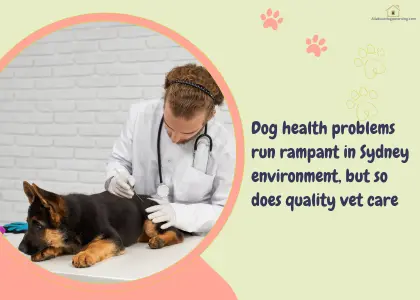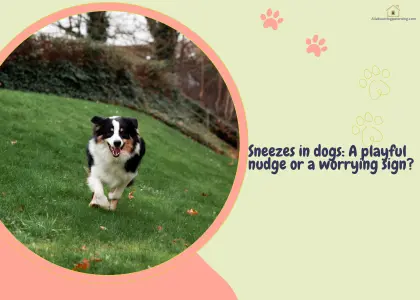Can Dogs Get Hiccups? Causes, Symptoms, and Treatment
Can dogs get hiccups? Yes, they can and they often do. If you’ve had a pet long enough, I’m sure you’d have noticed an occasional case of dog hiccups. The first few times it happens is surely puzzling. You might find yourself wondering, “What is the strange noise my pet is making?” “Why does it look like he/she is spasming?” “Is he/she going to throw up?”
I remember these questions running through my head when I saw my first GSD getting hiccups. Luckily, often it’s just a cute quirk and nothing to panic about. Veterinarian Dr. Ricky Walther, DVM, reiterates this, and says, “Yes, dogs can get hiccups and it’s usually harmless. On rare occasions, however, hiccups can be related to medical conditions.” So it pays to know what’s normal. In this guide I’ll explain the common causes, signs to watch for, simple remedies, and when a vet should be involved for dog hiccup treatment, based on my experience and expert advice from renowned veterinarians.
What Are Hiccups in Dogs?
Hiccups are the result of involuntary dog diaphragm spasms, which is the muscle under the lungs. When this breathing muscle twitches suddenly, your dog inhales sharply and emits a little “hic” sound. It’s exactly like our hiccups. An unplanned gulp of air and a tiny jerk. These episodes are usually benign.
Dr. Walther says, “Hiccups are as normal and harmless for dogs as they are for us.” Most of the time, your pup might just let out a soft hiccup noise and then go back to doing whatever they were. Normal hiccups in dogs clear up on their own within a few minutes and rarely last more than about 15–20 minutes.
Puppies tend to get them more than adult dogs, and the good news is that they usually fade with age. Overall, an occasional dog hiccup is just a blip in your pup’s breathing and not a sign of pain or distress.
Common Causes of Hiccups in Dogs

Even though they’re harmless, when you see your pet go through the spasms, it’s natural to wonder why dogs get hiccups. Well, several everyday things can trigger hiccups in dogs. Eating or drinking too quickly, sudden excitement, stress, or even temperature changes can set off the diaphragm. Puppies also get them more often simply because their systems are still maturing. Here are some of the most common causes of dog hiccups:
- Eating or Drinking Too Fast
When dogs gobble food or slurp water, they can swallow extra air. Dr Walther says, “The most common cause of dog hiccups is eating or drinking too quickly.” That trapped air forms a bubble that tickles the diaphragm, causing it to spasm. And you see your dog making that curious ‘hic’ sound. - Excitement or Stress
A sudden burst of energy or anxiety can jolt your dog’s breathing. Stress, excitement, and energetic play can be contributing factors to why dogs get hiccups. Meeting a new doggie friend or being startled by a sound can cause your dog’s heart rate to jump and that can lead to hiccups. - Temperature Changes
Icy water or a cold breeze can physically spasm the diaphragm, especially in younger dogs. Vets say that being too tired or cold can trigger puppy hiccups. If your pooch gulps down ice-cold water or steps into an air-conditioned room in summer, he might hiccup. - Puppy Development
Puppy hiccups are part of the growing up process. Their little bodies and breathing muscles are still maturing, and are therefore, more susceptible to spasming. Dr. Walthers says, “Hiccups are typically a puppy issue, and young dogs get them more frequently than mature dogs.”
I’ve seen it first hand, too. My pets have all been more prone to hiccups when they were little furballs I could scoop up in one hand, and grew out of it by the time they hit the 6-month mark. After my first, I don’t even pay much heed to a passing case of hiccups as long as the pupper seems active and is eating normally.
Symptoms of Hiccups in Dogs

Typical dog hiccups look and sound like short “hic” noises with a little chest or belly twitch, but otherwise your pup stays calm and happy. It’s important, though, to know when hiccups might signal a deeper issue. Let’s learn to differentiate between harmless symptoms of dog hiccups and ones that indicate an underlying issue:
- Mild/Harmless Symptoms
Most of the time, dog hiccups are very obvious and otherwise harmless. You’ll hear a few quick, soft “hic” sounds and see a tiny spasm of the chest or belly, but your dog will look happy and alert. Beyond dog hiccup signs of a little noise and twitch, there’s usually nothing else wrong with your pet. In fact, I often see mine just blink and then trot off to the next toy, as if nothing happened. If that’s all you notice, it’s generally harmless. - Concerning Symptoms
Pay attention if hiccups go on too long or come with other signs. For example, if hiccups persist more than a few hours or come with drooling, vomiting or wheezing, you may be dealing with an underlying medical issue. Lethargy or loss of appetite are also warning signs of a deeper issue. Basically, dog hiccup signs accompanied by nausea, cough, or significant lethargy and loss of appetite are red flags. It’s best to err on the side of caution and seek vet’s advice. - Differentiate from Other Issues
It helps to tell hiccups apart from similar noises. Reverse sneezing, for instance, can sound like a hiccup, but it’s really a snorting sound from the throat. Dr Walther says, “Reverse-sneezes sound scarier than they are, and, unlike hiccups, you often see your dog extending his neck and snorting repeatedly.”
If the sound is being brought on by your dog choking on something, you will notice signs of panic and distress in their body language. They may appear to strain and throw up whatever it is that’s lodged in or irritating their throat. A choking dog will look very distressed but a hiccupping dog stays calm the whole time.
The same parameter applies to dog hiccup vs cough difference. If your dog isn’t calm or if breathing sounds go from a little “hic” to a full-on wheeze, it’s a sign that it’s not just the diaphragm acting up.
Home Remedies and Treatments for Dog Hiccups
Most hiccups don’t need treatment, but if your pet gets them too often or seems discomforted by the spasms, here are a few things you can try to stop dog hiccups:
- Slow Down Eating
A simple fix is to slow your dog’s eating using a slow feeder or by serving smaller portions. This is one of my go-to dog care remedies for hiccups that never fails to do the trick. The reason is that most puppies gulp down their food in immense haste, and along with it, end up gulping air, which can cause the diaphragm to spasm. Using a slow-feeder forces your pet to chew their food, which can counter those relentless post-meal hiccups. Smaller bowls and puzzle toys can also do the trick.
- Gentle Calming Techniques
Helping your pet relax can also help break the cycle and stop dog hiccups. Here is what you need to do: make your dog lie down on their back and gently rubbing the belly to steady their breathing. A short calm walk or a few minutes of soft petting can also work wonders. You can also try distracting your pet with their favorite toy or giving them a quiet cuddle. The idea is to keep it mellow so that your dog calms down.
- Hydration and Warmth
The simplest dog hiccup treatment at home is to keep them comfortable, with proper hydration and temperature. Offer room-temperature or slightly cool water and encourage sipping, making sure your pet doesn’t gulp the water down as it will only worsen the hiccups. Avoid offering your pet ice cubes or super-chilled water, since cold can contract the diaphragm. If you notice your dog shivering after a bath or romp, dry and warm him up. Sudden chills can spasm the diaphragm, so a cozy blanket or towel goes a long way.
- When to Avoid Home Remedies
Dog care remedies can be a great way to offer relief for something as typically harmless as hiccups. However, it’s important to know when to stop and seek the right help. If you notice that the hiccups aren’t letting up after a bit of calm or are accompanied by other symptoms such as loss of appetite, lethargy, drooling, wheezing, it’s time to stop dog hiccup treatment at home and call your vet.
When to See a Vet for Dog Hiccups

When are dog hiccups serious? And when to call the vet about dog hiccups? When hiccups resolve quickly. Hiccups lasting more than a few hours or shifting into wheezing or labored breathing merit a vet check. Persistent hiccups, especially if they’re very frequent, could be a sign of gastrointestinal upset, respiratory illness, or other issues.
Also watch for dog health warning signs such as vomiting, coughing, or lethargy, on top of the hiccups. These combinations of symptoms should never be ignored. For example, chronic hiccups can sometimes occur with reflux or parasites. Your vet might listen to your dog’s lungs and stomach or do simple tests like checking temperature and hydration to rule out hidden problems.
Preventing Hiccups in Dogs
If hiccups seem to be bothering your pet, you can reduce their frequency significantly by building healthy daily habits. Small preventive measures go a long way. Here a few such measure that help in preventing dog hiccups:
- Encourage slow eating: Make mealtimes calm and consistent. Use puzzle feeders or spread kibble on a plate to slow your dog down so he chews each bite. Rushed eating is a top hiccup trigger
- Maintain a stress-free environment: A relaxed dog hiccups less. Provide regular exercise and training to burn off nervous energy. During meals, eliminate loud noises or competition. Give your dog a quiet spot and lots of gentle praise so he’s not on edge
- Watch food and water temperature: Avoid extremes. Always serve food and water at moderate temperature. Skip ice-cold water or boiling-hot food, especially in very cold or hot weather. A comfy temperature keeps the diaphragm calm
- Regular veterinary care: Following dog health tips that ensure overall well-being also help in preventing hiccups. Stay on top of vet check-ups, vaccinations and parasite prevention. Maintaining a healthy weight and diet means fewer stomach upsets and hiccups. Worms or chronic digestive issues can lead to hiccups, so prevention here helps
FAQs About Dog Hiccups
- Do puppies get hiccups more often than adult dogs?
Yes, hiccups are a typical puppy problem and puppies get them more frequently than mature dogs. Think of it as part of growing up. Most puppies outgrow the hiccups by around 6 months of age, so don’t worry if your fur baby hiccups after he eats or plays.
- Can dog hiccups be a sign of worms or parasites?
Not usually. Worms and parasites typically cause vomiting, diarrhea or coughing, not isolated hiccups. Hiccups alone are rarely a parasite sign. Only if your dog has hiccups along with GI symptoms such as vomiting, diarrhea, and weight loss, should you be concerned about worms. If that happens, mention it to your vet during your next visit.
- How long should normal dog hiccups last?
Most dog hiccups clear up in a minute or two. Experts note that dog hiccups clear up within a few minutes and almost never exceed about 15–20 minutes. If your dog’s hiccups go on continuously beyond 20 minutes or return frequently, it’s a good idea to check with the vet.
- Are hiccups painful for dogs?
No, they’re harmless. A hiccup is just a brief diaphragm twitch, like a spasm that makes a noise. Dogs stay perfectly relaxed through it. By contrast, a dog truly in distress like choking or a severe cough would be frantic and upset. So if your dog stays calm and eager during the hiccups, it means they aren’t painful at all.
- Can diet changes help reduce hiccups in dogs?
Yes, diet and feeding habits can make a difference. Sudden new foods can irritate a dog’s stomach and trigger hiccups. To minimize hiccups, introduce any new food gradually and avoid gas-inducing or rich treats. Feeding smaller, slower meals, using a slow-feeder bowl or puzzle, also helps by preventing gulping of air.
Takeaway
Hiccups in dogs are usually nothing to worry about, especially in playful or growing puppies. In my experience as a dog mom, a few hiccup fits after dinner or play are completely normal and often cute. The key is simply to keep an eye on your pup. If the hiccups ever seem endless or come with vomiting, coughing, or lethargy, consult your vet right away. Otherwise, rest assured that most dog hiccups will pass on their own without pain.







